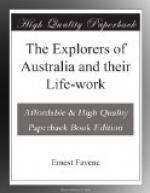A fresh start was made after a welcome halt at this well. Warburton and his son could scarcely sit their camels, and followed the weary caravan almost with apathy. On the 14th of November Charley found another native well; but its discovery nearly cost him his life. When close to the native camp, he had gone ahead by himself, as he usually did, so as not to startle the aboriginals. The blacks received him kindly and gave him water, but when he cooeed for his companion, they took sudden alarm and attacked him. They had speared him in the arm and back, and cut his head open with a club when Lewis came up just in time to rescue him. Evidently this attack was not premeditated, but caused by the sudden fear aroused by the sight of the white men and camels. At this well Lewis and one of the Afghans went ahead to strike the head of the Oakover, for they thought they must be drawing near the coast, as the nights were growing cool and dewy, and they had found traces of white iron work in an old camp. In a week Lewis returned, having reached a tributary of the river; and on the 5th of December the whole party arrived at the rocky creek that he had found.
They now proceeded slowly down the Oakover, but came across no sign of occupation. The indefatigable Lewis had therefore again to go ahead for help whilst the others waited for him, living on the flesh of the last camel. He had 170 miles to journey over before he reached the cattle station belonging to Grant, Harper, and Anderson, where he was immediately supplied with horses and provisions to take back to the starving men.
It was on the 29th of December as Warburton was lying in the shade thinking moodily that the station must have been abandoned, and that Lewis had surely been compelled to push on to Roebourne, when the black boy from a tree-top gave a cheerful signal. Starting to their feet, the astonished men found the pack-horses and the relief party almost in their camp.
Of the seventeen camels with which they had started, the two that Lewis had taken on to the station were the only survivors; and all their equipment had been abandoned piecemeal in the desert.
15.4. WILLIAM CHRISTIE GOSSE.
[Illustration. William Christie Gosse, Deputy Surveyor-General of South Australia.]
On the 23rd of April, about a week after the departure of Warburton, William Christie Gosse, Deputy Surveyor-General of South Australia, also left Alice Springs on an exploring expedition, having been appointed by the South Australian Government to take charge of the Central and Western Exploring Expedition. Like Warburton, he was frustrated by dry country in his endeavour to reach Perth. He had with him both white men and Afghan camel drivers, and a mixed outfit of horses and camels. He left the telegraph line and struck westward, soon finding himself in very dry country, where he lost one horse on a dry stage. He made a depot camp on a creek which he called the Warburton,




